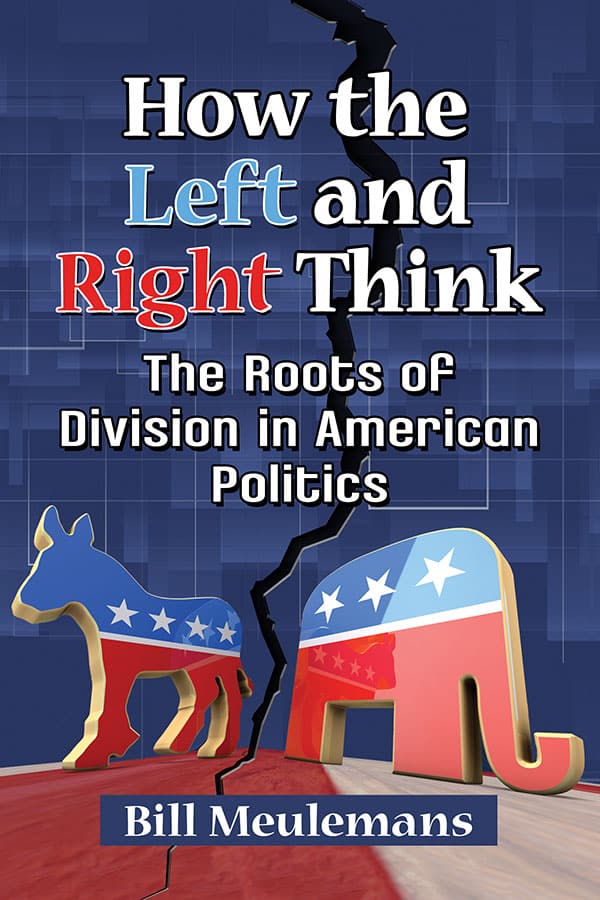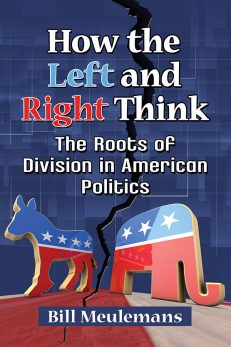How the Left and Right Think
The Roots of Division in American Politics
$19.99
In stock
About the Book
Emerson said of the left and right, “Each is a good half, but an impossible whole.” In public affairs, the left traditionally pushes for political, economic and social progress, while the right steers towards individual opportunity, stability, tradition and the maintenance of gains already made. Their disagreement is the basis of most of our political discourse. Drawing on four decades of field research on partisan conflicts in the U.S., Northern Ireland and Israel, the author provides a clear, concise explanation of how the left and right think and why their respective philosophies reflect competing views of human nature.
Click here for questions that appear at the end of each chapter.
Instructors considering this book for use in a course may request an examination copy here.
About the Author(s)
Bibliographic Details
Bill Meulemans
Format: softcover (6 x 9)
Pages: 290
Bibliographic Info: bibliography, index
Copyright Date: 2019
pISBN: 978-1-4766-7878-8
eISBN: 978-1-4766-3691-7
Imprint: McFarland
Table of Contents
Acknowledgments v
Preface 1
Introduction 3
1. What’s Happening to Us? 7
Secret Money 11
Undermining the Electorate 15
Why It Happened 17
Reformers of the Left and Right 18
Nowhere Else to Go 19
White Supremacists 24
Necessary Reforms 27
Questions for You 33
2. Left and Right 35
Fixing Society 38
Criticisms of the Left 41
Criticisms of the Right 45
Charges and Counter Charges 47
Blind Spots 51
Illegal Politics 56
Questions for You 61
3. Foundations of Politics 63
New Words for Old Ideas 68
Eternal Questions 69
Outside Threats 76
A Poor People’s Conference 81
Questions for You 86
4. Personal Experiences 89
The Function of Ideologies 90
Learning Political Values 93
An Autobiography of a Liberal 98
An Autobiography of a Conservative 104
Advantages and Disadvantages 110
Morality 120
Questions for You 125
5. Expectations and Deprivations 127
Role of the Central Government 128
Constitutionalism 129
Setting the Scenario 130
Consequences 134
Post-World War II (1945 to the Present) 136
Unfinished Business 142
Attacking the System 143
Success and Anger 145
Questions for You 148
6. Left-Wing Values 150
What They Believe 151
In Their Own Words 153
Basic Problems for the Left 160
Saul Alinsky 164
Revolutionaries on the Left 166
Problems for Revolutionary Radicals 167
The Communist Party 169
Questions for You 171
7. Right-Wing Values 173
What They Believe 173
In Their Own Words 176
Basic Problems for the Right 183
Mitt Romney 186
Revolutionaries on the Right 188
Problems for Revolutionary Reactionaries 190
The Ku Klux Klan 192
Questions for You 197
8. Ideas and People Move to the Right 199
Public Reactions 201
Self-Interest 202
Betrayal of Principles 203
Revolution of the Right or Left? 205
The Flip-Flop 207
More or Less Freedom? 212
Negative and Positive Freedom 215
The New Reactionaries 219
The New Radicals 226
Questions for You 231
9. Moderates, Activists, and Extremists 233
Moderates: Liberals and Conservatives 236
Moderates: Characteristics in Common 240
Activists: Radicals and Reactionaries 241
Activists: Characteristics in Common 246
Extremists: Revolutionary Radicals & Revolutionary Reactionaries 247
Extremists: Characteristics in Common 252
Questions for You 255
10. Beyond Ideology 257
Left and Right 258
Predictability 259
Political Manners 262
Trump versus Anti-Trump 263
A Recipe for Disaster 265
The Dark Corners of America 267
Questions for You 270
Bibliography 273
Index 277
Click here for questions that appear at the end of each chapter.
Book Reviews & Awards
- “Invaluable…recommended”—Midwest Book Review.






